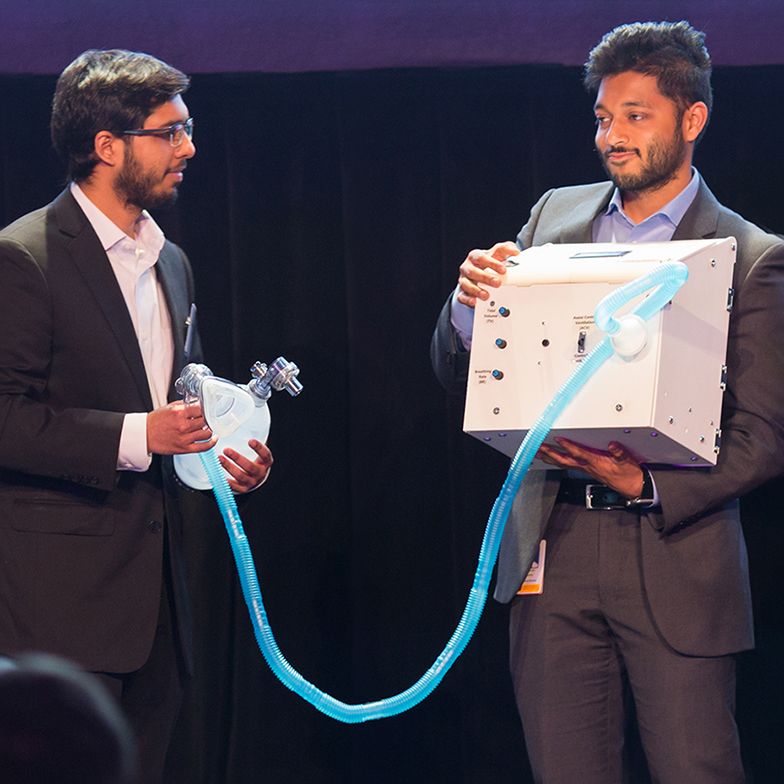University Collaborations
In response to the global coronavirus pandemic, a number of current and former teams in the Venture Program doubled down or pivoted to help address the myriad challenges posed by the virus. “They created products and services that have the potential to reduce the spread of the virus, improve patient care, and create community when in-person gatherings aren’t possible,” explains Matt Segneri (MBA 2010), the Bruce and Bridgitt Evans Executive Director of the Harvard Innovation Labs. “A crisis like this illuminates the importance of innovation.”
One example is Umbulizer, which offers a reliable, portable ventilator at 10 percent of the cost of a $40,000 hospital-grade machine. The device recently gained emergency FDA authorization for use in the United States.
“Even before COVID-19, there was a critical shortage of ventilators in health care settings across the globe . . . we knew we had a proven product that could help.”
Cofounder, Umbulizer

“Even before COVID-19, there was a critical shortage of ventilators in health care settings across the globe . . . we knew we had a proven product that could help.”
Cofounder, Umbulizer
“Even before COVID-19, there was a critical shortage of ventilators in health care settings across the globe,” notes Sanchay Gupta (MD/MBA 2022), who cofounded Umbulizer in 2017 and serves as chief medical officer. Before the pandemic developed, Umbulizer’s affordable device was already in use in hospitals and mobile medicine settings in Pakistan, supplementing the country’s limited supply of just 2,000 conventional ventilators for a population of 210 million people.
“When ventilator shortages became an issue in the United States, we knew we had a proven product that could help,” says Gupta. The company moved quickly to establish a manufacturing operation in Boston and is working with hospital and state officials to build up reserves of the device for use in the event of future surge demand.
Umbulizer took home the $75,000 grand prize in the health/life sciences track of the 2020 President’s Innovation Challenge, in which the top 100 teams are invited to compete for over half a million dollars in prizes provided by the Bertarelli Foundation.
The Umbulizer team has been in the Venture Program since 2018, consulting with i-lab advisors at critical development stages, networking with venture capitalists and other founders, and attending targeted workshops led by experts from Harvard and beyond. Student teams have exclusive access to advising, technical resources, and other programming.
“We’ve received support with everything—from assembling an international team with diverse technical skills to navigating the notoriously complex regulatory pathway for medical devices,” Gupta says. “Sometimes, just being able to bounce around ideas with other founders late at night was exactly what we needed to move forward. The i-lab is an amazing place to nurture a startup.”
“The creative problem-solving the i-lab fosters is more essential now than ever. This resilient community is clearly delivering on HBS’s mission to make a difference in the world during the pandemic.”
Other student teams that responded to the pandemic include June Motherhood, which aims to democratize access to quality prenatal and postpartum care. The startup, which is led by Sophia Richter, Kristina Beilinson, and Julia Cole (all MBA 2020), quickly adapted its affordable online offerings to include classes geared to birth and postpartum challenges associated with the coronavirus. Hikma Health added a module to its digital health platform that enables doctors to screen for COVID-19 in underserved and refugee populations. Jordan Lebovic (MD/MBA 2020) was the company’s chief research officer until he began his medical residency in June.
“The creative problem-solving the i-lab fosters is more essential now than ever,” notes Segneri. “This resilient community is clearly delivering on HBS’s mission to make a difference in the world during the pandemic.”

